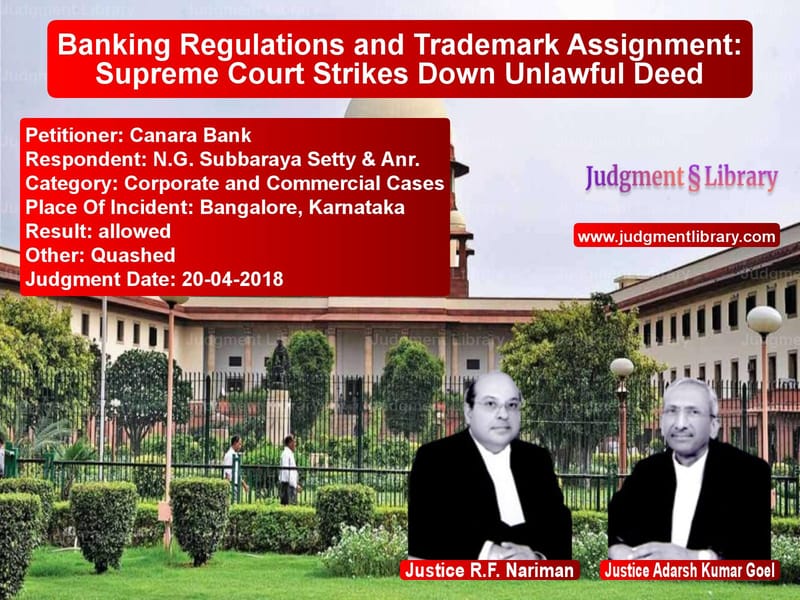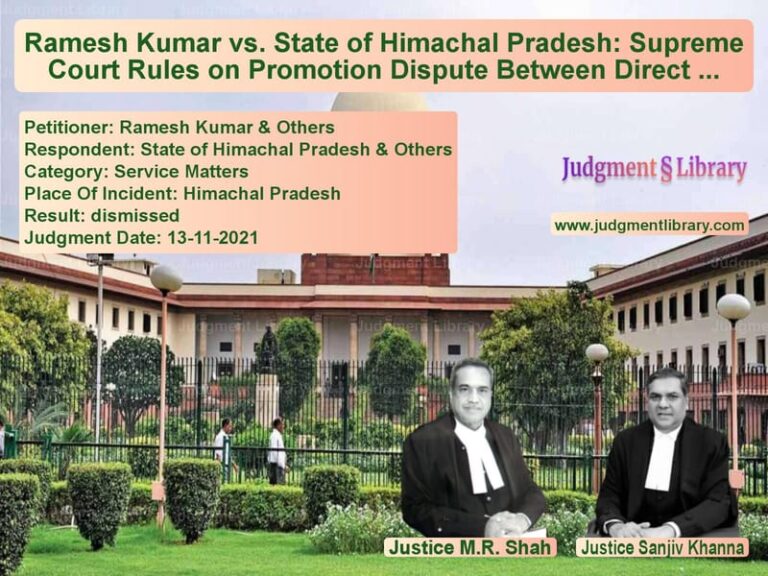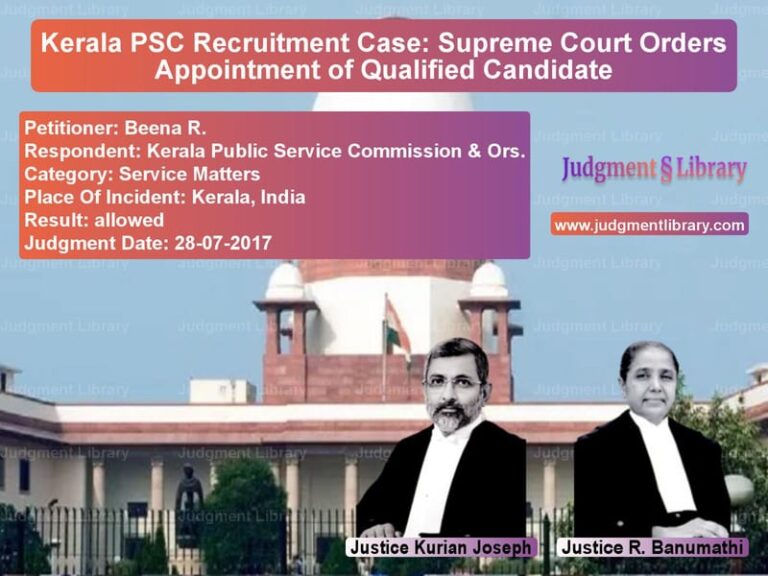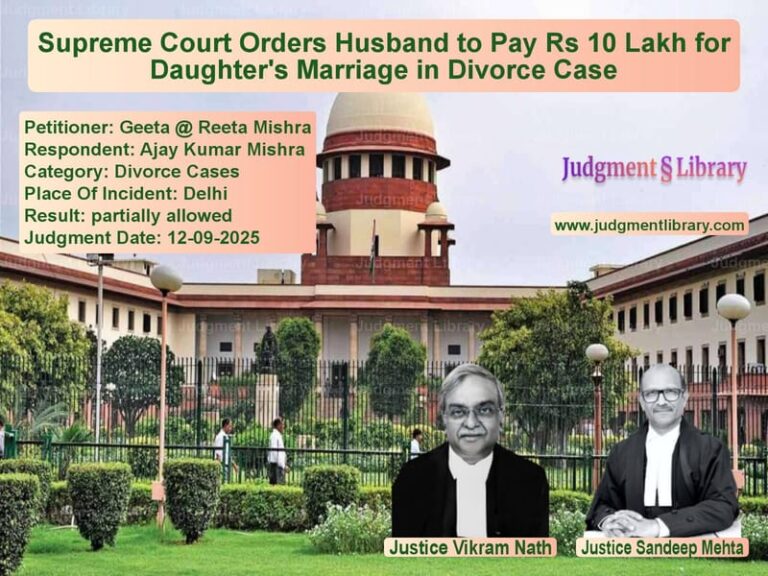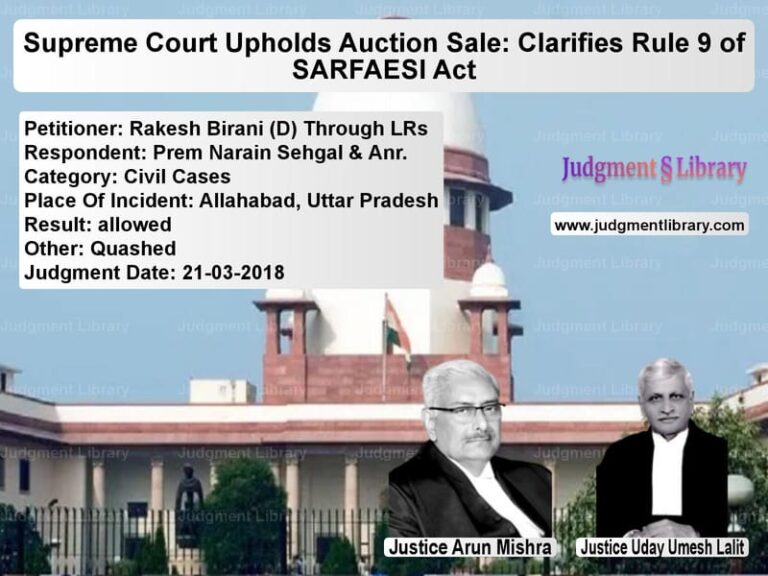Banking Regulations and Trademark Assignment: Supreme Court Strikes Down Unlawful Deed
The case of Canara Bank vs. N.G. Subbaraya Setty & Anr. is a significant judgment concerning the enforcement of contracts in the banking sector and their compliance with statutory provisions. The Supreme Court had to determine whether a trademark assignment agreement between Canara Bank and the respondent was valid under Indian law or if it was prohibited by the Banking Regulation Act and the Trade Marks Act.
The case revolved around a credit facility that Canara Bank extended to the respondent, N.G. Subbaraya Setty, in 2001. In exchange for the loan, the respondent agreed to assign the trademark ‘EENADU’ for incense sticks to Canara Bank under an assignment deed executed in 2003. However, Canara Bank later claimed that the agreement violated banking regulations, leading to litigation over the enforceability of the deed.
Background of the Case
Respondent No.1, N.G. Subbaraya Setty, had taken a loan from Canara Bank. To settle the dues, an assignment deed was executed, transferring the trademark ‘EENADU’ to the bank for a period of ten years. The agreement stipulated that the bank would receive monthly payments from the respondent and could also license the trademark to third parties.
However, after the execution of the assignment deed, Canara Bank issued a letter dated 27.01.2004, stating that under the Banking Regulation Act, banks could not own intellectual property rights. The bank unilaterally canceled the assignment agreement. In response, the respondent filed a suit challenging the cancellation, arguing that the contract was valid and binding.
Key Issues Before the Court
- Whether the assignment deed was enforceable given the restrictions imposed by the Banking Regulation Act.
- Whether the agreement was valid under the Trade Marks Act, particularly in light of its non-registration under Section 45.
- Whether the doctrine of res judicata prevented the bank from contesting the validity of the agreement.
Arguments by the Petitioner (Canara Bank)
- The bank argued that it was legally barred from holding trademarks under Sections 6 and 8 of the Banking Regulation Act.
- It contended that the assignment deed was illegal and unenforceable from inception.
- The bank relied on Section 45(2) of the Trade Marks Act, which requires trademark assignments to be registered to be admissible in court.
- It also pointed out that its manager, who had executed the agreement, was later dismissed for misconduct, raising concerns about the deed’s validity.
Arguments by the Respondent (N.G. Subbaraya Setty & Anr.)
- The respondent maintained that the bank had willingly entered into the agreement and had benefitted from it.
- They contended that a prior ruling upholding the deed prevented the bank from raising the issue again under the principle of res judicata.
- They argued that the agreement was a legally valid contract and that the bank was attempting to evade its obligations.
Supreme Court’s Observations
The Supreme Court thoroughly examined the arguments and made the following key observations:
- The assignment deed was unenforceable because it violated Section 8 of the Banking Regulation Act, which explicitly prohibits banks from engaging in non-banking businesses, including trading in trademarks.
- Section 45(2) of the Trade Marks Act states that an unregistered assignment deed cannot be admitted in evidence for proving title to a trademark. The agreement was unregistered and therefore inadmissible.
- Res judicata does not apply when a decision upholds an illegal transaction. Even if a lower court previously ruled in favor of the respondent, the Supreme Court could strike down the agreement for violating statutory prohibitions.
Legal Principles Affirmed by the Court
This case reaffirmed several important legal principles:
- Public Policy and Illegality: Courts cannot enforce contracts that violate statutory prohibitions, regardless of previous rulings.
- Restrictions on Banking Activities: Banks must operate strictly within the confines of the Banking Regulation Act and cannot engage in trade or hold intellectual property rights.
- Importance of Registration: The Trade Marks Act requires assignment deeds to be registered for enforcement, reinforcing the importance of statutory compliance.
- Limitations of Res Judicata: If an earlier judgment upholds an illegal agreement, it does not prevent future courts from declaring it void.
Final Judgment
The Supreme Court ruled in favor of Canara Bank and issued the following directives:
- The assignment deed was declared null and void as it violated the Banking Regulation Act and the Trade Marks Act.
- The respondent’s suit for payments under the invalid deed was dismissed.
- Previous rulings that upheld the agreement were overturned, as res judicata cannot validate an unlawful contract.
- The bank was not required to honor the agreement, and any pending financial claims based on the deed were dismissed.
Impact of the Judgment
This ruling has far-reaching implications for banking regulations and contract enforcement in India. It highlights the importance of compliance with statutory provisions and ensures that financial institutions operate within legal boundaries. The judgment also reinforces the principle that contracts violating the law cannot be upheld, even if previous rulings suggested otherwise.
Furthermore, the case clarifies the applicability of res judicata, making it clear that the doctrine does not shield illegal transactions from judicial scrutiny. This will serve as a precedent for future cases involving statutory violations and contractual enforceability.
Petitioner Name: Canara Bank.Respondent Name: N.G. Subbaraya Setty & Anr..Judgment By: Justice R.F. Nariman, Justice Adarsh Kumar Goel.Place Of Incident: Bangalore, Karnataka.Judgment Date: 20-04-2018.
Don’t miss out on the full details! Download the complete judgment in PDF format below and gain valuable insights instantly!
Download Judgment: Canara Bank vs N.G. Subbaraya Setty Supreme Court of India Judgment Dated 20-04-2018.pdf
Direct Downlaod Judgment: Direct downlaod this Judgment
See all petitions in Company Law
See all petitions in Corporate Compliance
See all petitions in Judgment by Rohinton Fali Nariman
See all petitions in Judgment by Adarsh Kumar Goel
See all petitions in allowed
See all petitions in Quashed
See all petitions in supreme court of India judgments April 2018
See all petitions in 2018 judgments
See all posts in Corporate and Commercial Cases Category
See all allowed petitions in Corporate and Commercial Cases Category
See all Dismissed petitions in Corporate and Commercial Cases Category
See all partially allowed petitions in Corporate and Commercial Cases Category

